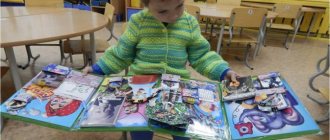Situational conversations with parents. Subject.
- Situational conversation with parents about the well-being of children.
- Situational conversation with parents about the rules of behavior in the group.
- Situational conversation with parents “Why does a child need to be able to dress himself?” Fix the sequence of dressing and undressing.
- A situational conversation with parents about why the child needs time off from the teacher to go home.
- Situational conversation with parents about the need to wash hands before eating.
- A situational conversation with parents about the rules of behavior with each other, about the need to be polite, not to fight, not to be greedy.
- A situational conversation with parents about how to properly ask the teacher for time off.
- Situational conversation with parents about “How friendly guys play in a group”
- Situational conversation with parents about the benefits of proper nutrition. About the ban on bringing sweets to the group.
- A situational conversation with parents about how to behave at a holiday or performance.
- Situational conversation with parents about table manners.
- A situational conversation with parents about the work of a teacher or assistant teacher.
- Situational conversation with parents “About the rules of conduct in kindergarten.”
- A situational conversation with parents about the need to maintain order in the group.
- A situational conversation with parents about what children are doing in kindergarten.
- Situational conversation with parents about the need for morning exercises.
- A situational conversation with parents about the need to continue teaching children to use cutlery.
- Situational conversation with parents “The child’s favorite dish.”
- Situational conversation with parents. Help from parents in arranging the playground.
- Situational conversation with parents about food.
- Situational conversation with parents “What are the benefits of vegetables and fruits?”
- Situational conversation with parents about the weather.
- Situational conversation with parents “Your child’s health”
- Situational conversation with parents “Why does a child need to be neat?”
- Situational conversation with parents about cleanliness and neatness.
- Situational conversation with parents “How to dress a child warmly.”
- Situational conversation with parents “Why does a child need a handkerchief?”
- Situational conversation with parents “How to dress a child for a walk in winter”
- Situational conversation with parents about the rules of behavior in kindergarten.
- A situational conversation with parents about whether your child is fighting.
- A situational conversation with parents about gifts given for the New Year.
- Situational conversation with parents “Teaching a child to fold things correctly and neatly”
- Situational conversation with parents “What to do to prevent your child from getting sick in winter”
- A situational conversation with parents about the need for children to say hello in the morning.
- A situational conversation with parents about the rules of behavior in the music room during a matinee.
- Situational conversation with parents about ice.
- Situational conversation with parents about the need for vaccinations.
- Situational conversation with parents about safe toys.
- Situational conversation with parents about the properties of water.
- Situational conversation with parents about the dangers of sweets.
- Situational conversation with parents to familiarize themselves with the work schedule on holidays.
- A situational conversation with parents about games that children can play and which cannot.
- A situational conversation with parents about the right clothes for a walk.
- Situational conversation with parents about the rules of behavior in public places.
- A situational conversation with parents about the need to clean up toys after themselves.
- Situational conversation with parents about politeness and etiquette.
- A situational conversation with parents about the need to follow the rules of safe behavior in a group and on a walk.
- A situational conversation with parents about how things should be in the closet.
Planning group consultations for parents of preschool children
Vera Lipina
Planning group consultations for parents of preschool children
Planning group consultations for parents
Goal: assistance in understanding your own child, in finding and choosing adequate ways, means and methods of education; familiarization with the general patterns of child ; increasing the socio-psychological competence of parents , teaching them communication skills, resolving conflict situations, improving the style of parental behavior .
Tasks: can be classified based on the characteristics of each period of the child’s development and the range of problems that he must solve at each stage independently.
• changing the psychological attitude of teachers and parents on the role of the family in shaping the child’s personality
• diagnostics of the family, the conditions of family education and the needs of parents
• widespread use of the pedagogical capabilities of the parents (rights and responsibilities, interests and capabilities of parents )
• organization of psychological and pedagogical assistance to the family
• the use of active forms of communication with parents , developing pedagogical skills, family communication skills, psychological and pedagogical vigilance
Time: 2 times a month
Duration: 1-1.5 hours in the evening
Effectiveness: as a result of the survey, the specific effects are an increase in their sensitivity to the child, the development of a more adequate understanding of children's capabilities and needs, the elimination of psychological and pedagogical illiteracy, a productive reorganization of the arsenal of means of communication with the child.
the relevance of working with parents in the fact that parents very often spontaneously relate to the process of education. It happens that the reasons for difficulties in communication lie in the position of the parents . Some of them make mistakes in their upbringing, but do not want to see them, correct them, and sometimes simply not notice them, blaming them on the influence of society. parents and the fact of his acceptance in the family as an individual capable of self-development also have a great influence on the development of the child
Long-term planning of group consultations for parents
Month
Participants Topics Purpose Contents
September Parents of the toddler and junior groups . preschool age Child's adaptation to new social conditions.
How to help your child adapt faster to kindergarten. Introduce parents to the adaptation process. Definition of the concept of “adaptation”
, levels of adaptation.
Test for parents
.
” Types of assistance in the adaptation process from parents .
September Parents of all age groups Features and patterns of development of a preschool . Give an idea of the characteristics of children's along the main lines of development. Features of child development, drawing up a portrait with the help of parents . Test drawing for parents “I am a child, an adult, a parent ”
; test interpretation.
October Middle-aged and older parents Children's problems are parents' problems .
Helping parents solve problems in learning, development and communication with the child. Consideration and discussion of anonymous questions, exchange of life experiences, familiarity with psychological and pedagogical literature. Active participation of all parents
October Parents of older age groups Me and my child . Solving problem situations. Introduce popular literature on issues of communication and child development. Give parents to look at their child through the eyes of other parents ; the opportunity to gain new knowledge about child development
November Parents of the toddler and junior groups . preschool age parents need to know about children's stubbornness and capriciousness. Introducing parents to the psychology of raising young children . Define the concepts of capriciousness and stubbornness. Characteristics of the emotional development of a child of early and early preschool age , features of the course of age-related crises . Manifestation of stubbornness and capriciousness in behavior, ways of communicating with a child in such situations, satisfying the need for personal realization of one’s “I”
November Parents of senior and preparatory groups What kind of dads we are , what kind of mothers we are Introducing parents to the psychology of raising children , defining ideal parents Getting to know the characteristics of the existing typology of moms and dads, styles of communication with the child. Carrying out the test method by A. Varga.
Suggestions from parents on the issue of drawing up a portrait of “ideal parents ”
, comparing yourself with the proposed portrait
December Parents of all age groups Relationships in the family. Do you know your child?
Definition of relationships within the family; development of ideas about your child, development of a new style of relationships Test method “Family Circle”
.
Determination of relationships in the family, difficulties, communication style, drawing up an individual portrait of the child based on the observations of the teacher and parents
December Parents of the primary and junior groups . preschool age Emotional
behavioral disorders.
To introduce the characteristics of the emotional development of young children ; disorders in emotional development, methods and methods of correction using non-traditional techniques. Characteristics of emotional development in chronological order. Features of the age period from 0 to 1 year of life, from 2 to 3 years. Difficulties in controlling behavior during these periods. Correction methods, removal of negativity.
January Parents of middle and older age groups How we raise our child (ways of encouragement and punishment)
.
Determining the educational potential of parents using rewards and punishments.
Is it possible to do without punishment? Workshop for parents ; "round table"
; discussion of existing rewards and punishments; the reasons for certain actions, the sources of their origin, the pros and cons of each method, the impact on the personal development of the child. Solving problem situations
January Parents Jr. and average groups Temperamental characteristics, consideration in the upbringing and development of the child Determine the child’s temperament; characteristics of individual characteristics and style of activity, the relationship between the temperaments of parents and children. Test questionnaire (observation)
of parents to determine the temperament of the child. Characteristics of each type of temperament, their relationship, influence on the personal development of the child. Features of behavior, characteristics of the type of activity, emotional state. Games for children of every temperament
February
Parents Jr. , Wed. and senior groups Children's fears The nature of fears. How to help your child overcome his fear. Methods for correcting children's fears. Children's fears at an early age . Carrying out the test methodology Zakharova A. I. explanation of the causes of fears, words, movements that form fears in children . Differences in fears between girls and boys, age periodization of fears. Fears leading to the development of a neurotic personality.
February
Parents of middle and older groups Children's aggressiveness Factors provoking the emergence of children's aggressiveness. Features of behavior and methods of correction through the organization of a game situation. The influence of the family on the emergence of aggressive behavior as a method of defense. Consideration of specific pedagogical situations, cases of manifestation of aggressive behavior towards children, adults, objects. Correction of aggressive behavior, building new relationships, displacing aggressive reactions through non-traditional techniques.
March
Parents of elders and preg . groups Hyperactivity is a disease or behavioral characteristic. Introduction to the concept of MMD, the structural features of the NS in a young child , the relationship between the influence of the NS on the child’s behavioral reactions. Hustlers and mumblers, what they are. Determination of a child’s temperamental characteristics using an observation scheme. A story about MMD using a specific example. Methods of organizing activities and the educational process, taking into account behavioral characteristics, the influence of irritating factors.
March
Parents of all age groups About the characteristics of psychological and social development Individual characteristics of the child’s development. Drawing up a portrait of a child based on observation and psychological testing (at the request of the parents )
Individual
consultations for parents on issues of education, development and upbringing of the child. Individual age characteristics .
Temperamental characteristics, properties of the nervous system, character, types of activities, etc. April
Parents are ready . groups How to choose a school : psychological adaptation Definitions of the concept of “readiness for schooling”
and constituent concepts, the formation of psychological readiness for schooling, types of schools according to areas and training programs.
Familiarity with existing educational programs and their focus. To help parents choose the right direction for their child’s development, based on his development, skills, and knowledge.
Familiarity with the literature on this topic. April
Parents are ready . groups Readiness for school : psychological aspect.
Diagnosis of readiness for school, constituent elements. Child self-esteem as an important element in school readiness. Introduction to test methods. Testing, types of test methods, conversations when admitting a child to school. Recommendations regarding conversations with the teacher, the child’s focus on learning at school. Exchange of experience between parents .
May
Parents of all age groups How to develop a child at home. Why does a child need play? Acquaintance with existing educational programs, types of educational games and their organization. The influence of home development on the formation of a child’s personality. Parents are given ready-made cards with existing games for children of different ages to familiarize themselves with and play with their parents . Discussion of the influence of games on child development. Development of cognitive and mental activity, communication.
May Parents of all age groups Psychological safety of the child. How to spend free time with your child Organizing the child’s independent activities.
Introducing home development programs and getting to know the city. Creative debate about the city holiday, organization of games to get to know the city, familiarization with the educational programs we have for getting to know the city (museums, theaters, libraries, etc.)
. issues of child safety when organizing his free activities at home and on the street, compliance with safety rules.





